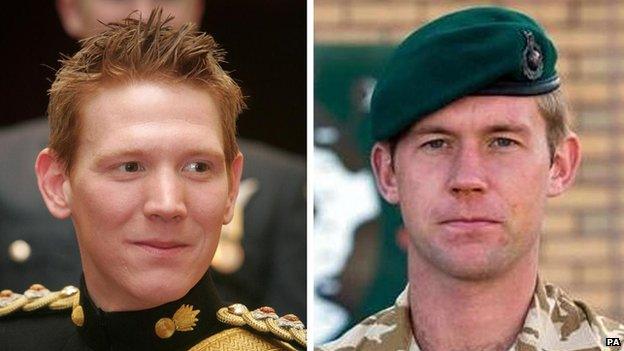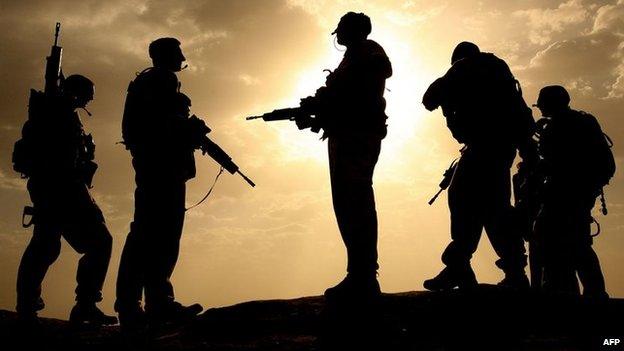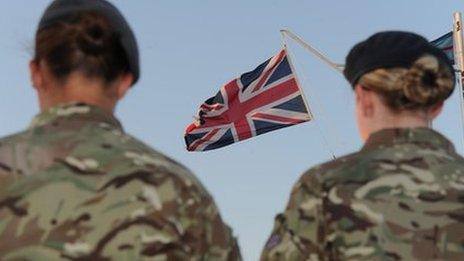Two UK servicemen 'killed by friendly fire' in Afghanistan
- Published

Capt Tom Sawyer, of the Royal Artillery (L), and Cpl Danny Winter, of the Royal Marines (r), died in 2009
Two UK servicemen died in Afghanistan when they were mistakenly targeted with an anti-tank missile in a "friendly fire" incident, an inquest has heard.
Capt Tom Sawyer, 26, from Hertfordshire, and Cpl Danny Winter, 28, of Stockport, died in the explosion in central Helmand in January 2009.
Coroner David Ridley said the missile had been fired by Gurkhas under a Danish commander's orders.
The pair were killed on a rooftop close to Forward Operation Base Gibraltar.
They were providing fire support for an operation clearing Taliban compounds, north-east of Gereshk, when the incident happened.
It was believed it involved a Javelin anti-tank missile, Mr Ridley said.
The missile itself was fired by former Lance Corporal Premkuma Sherpa, supported by Rifleman Bhaj Kumar Gurung, on the order of the Danish lieutenant, referred to as Soldier A, the inquest heard.
The coroner explained that the British forces had been involved in a joint operation with a Danish battle group.
The Danish soldiers had declined to attend the inquest in Salisbury, Wiltshire, Mr Ridley said, and their evidence would be given by means of witness statements.
Training
Major Robert Taylor, chief instructor in Javelin training for the anti-tank division at Warminster, Wiltshire, at the time of the incident, told the inquest that the weapon's primary purpose was to defeat enemy armoured vehicles.
He said soldiers had told him that it was also being used as an "anti-personnel weapon" from as early as 2006.
Troops were not given specific training for this, he said, and the training programme had not been changed despite this feedback.

British forces faced fierce battles over a number of years in Helmand
"Had I known the detail [of the incident] at an earlier stage, we would have looked at our position for further training," he said.
He explained the Javelin system had only a single viewfinder, unlike armoured vehicles.
This meant only the person firing the weapon could see the target and commanders would often ask to view the target before the shot was fired.
'Our hero'
Maj Taylor said the Danish officer who ordered the firing would not have been trained in its use.
He said the weapon was not "user-friendly" to those who were not trained.
"The essential point is the engagement shouldn't occur unless there is a high degree of confidence that the target is a viable enemy," he said.
Capt Sawyer, of the Royal Artillery, had been deployed as a fire support team commander attached to Zulu Company, 45 Commando Royal Marines.
Cpl Winter was a specialist mortar fire controller and was serving with the mortar troop of the same company.
Two other members of the patrol were injured in the explosion, which happened on 14 January, 2009.
In a statement released after his death, Capt Sawyer's family paid tribute to him as "our hero."
Lt Col Jim Morris, commanding officer, 45 Commando Group, described Cpl Winter as an "exceptional, clear thinking" Royal Marine.
'Culture concerns'
Lt Col Andrew Muddiman, who was based at Forward Operation Base (Fob) Gibraltar, described it as the "wild frontier" as it was surrounded by Taliban hideouts.
The Danish troops were based in the more secure location of Gereshk town.
He said: "The enemy had mined and booby-trapped around the Fob.
"Just by stepping out of the door we risked stepping on something and the Taliban owned the night."
Lt Col Muddiman said that the British troops had a "good working relationship" with their Danish counterparts although there were some concerns about "different cultures and expectations".
The inquest, which is to last for two weeks, was adjourned until Tuesday.
- Published16 December 2013
